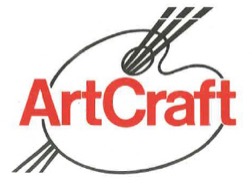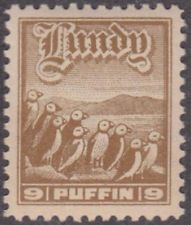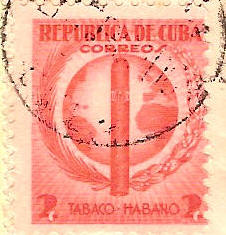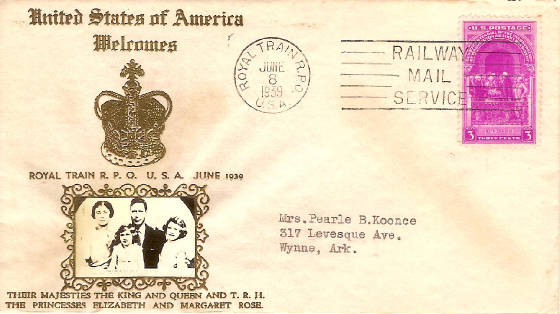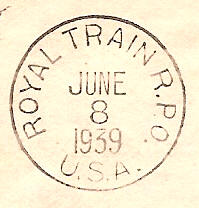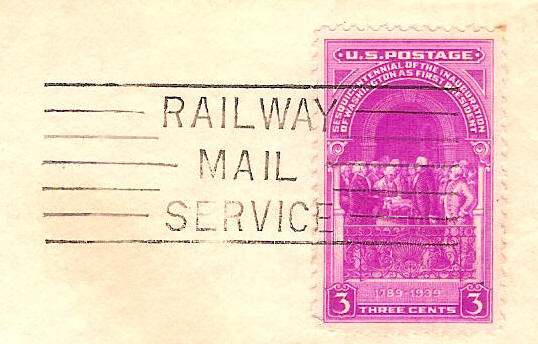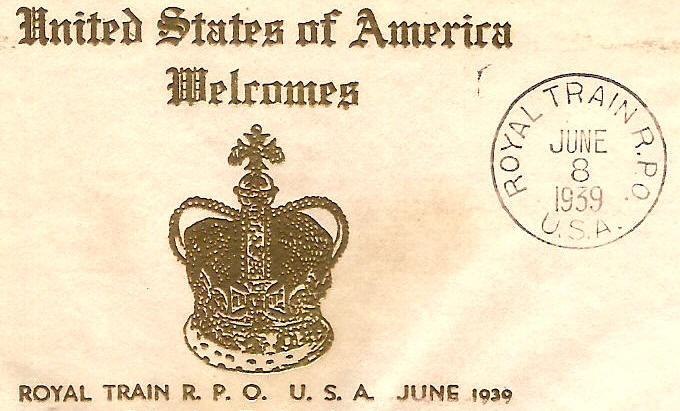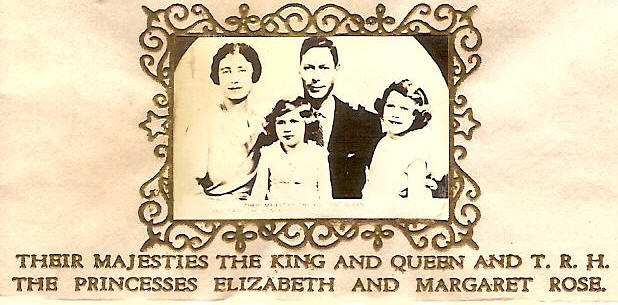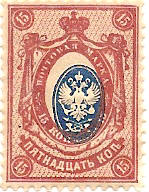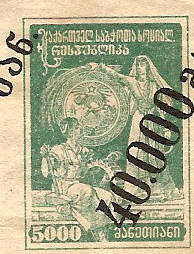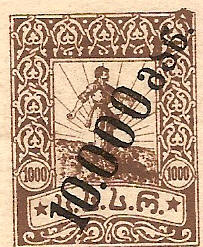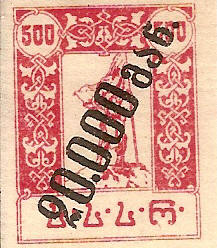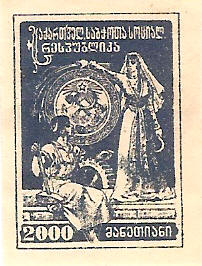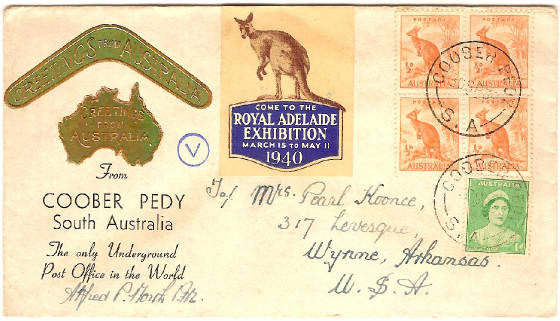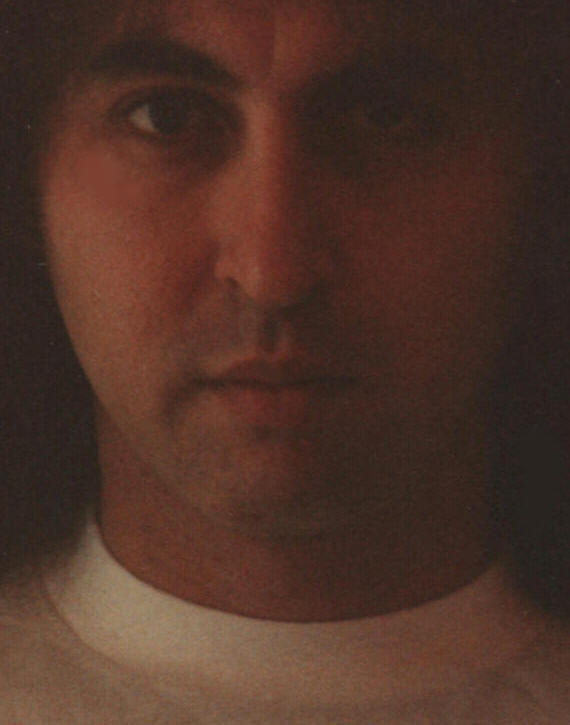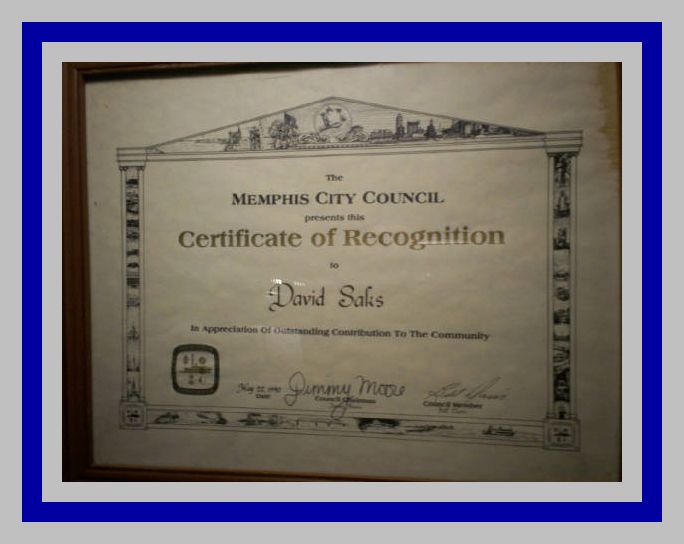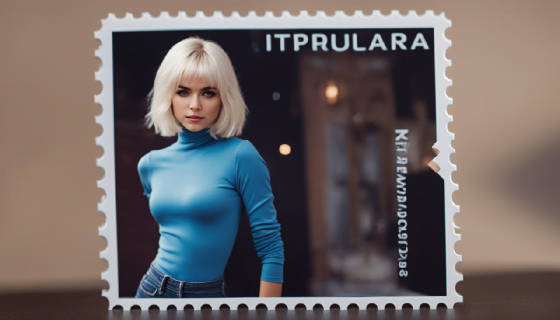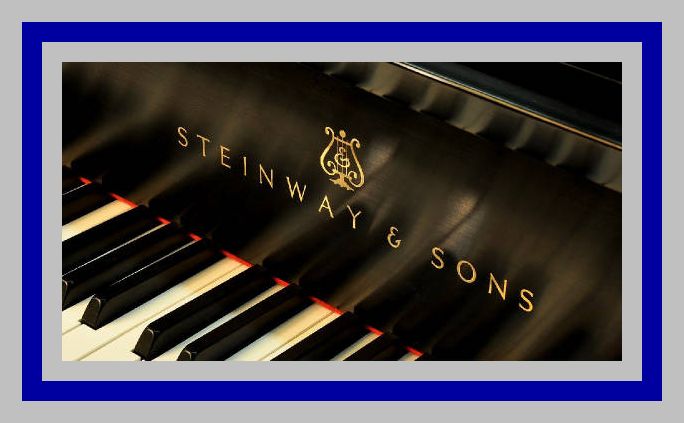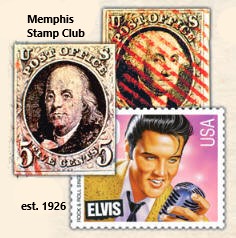|
Saturday, May 27, 2017
The Brown Ribbon of Germany - One of Hitler's Greed-Driven Stupid IdeasThe Brown Ribbon of Germany was an annual July horse race
run in Munich (Riem), from 1934 to 1944. One of the best known racing venues in Germany was the race track at Riem, just
a few short miles from Munich. This souvenir
sheet, Scott #B90, is a semi-postal issued to raise funds for a sweepstakes prize for horseracing. 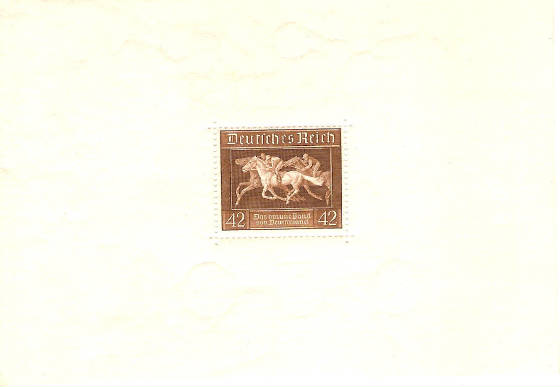
Each sheet sold for 1.50 marks at the race
course and select post offices. The 1.08m
surtax on each 42-pfennig stamp went toward a sweepstakes prize of 100,000 marks. “Munchen Riem 1936” appeared
as a watermark in the sheet margin. This is
the first semipostal stamp associated with the Brown Ribbon Derby, issued June 22, 1936, as a single-stamp souvenir sheet
(Scott B90) to commemorate the third running of the race. A closer look at Scott #B90 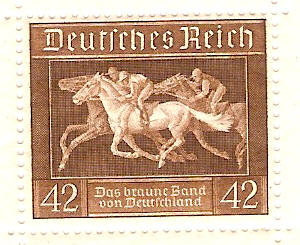
And the souvenir sheet with "Munchen Riem
1936” as a watermark in the sheet margin. 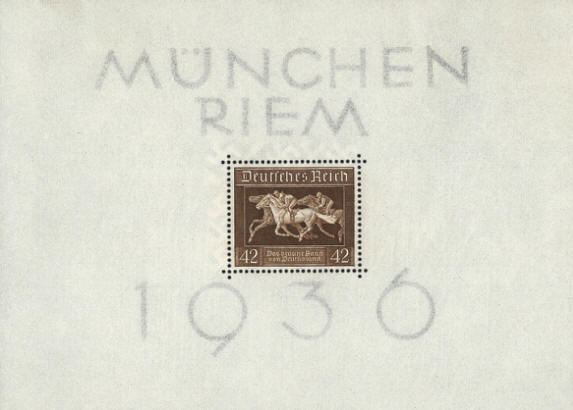
The destruction of the Third Reich in 1945
put an end to Germany's semipostal stamps benefiting horse racing, one of many of Hitler's stupid ideas that wrecked a nation
that was great before the filthy Nazi party came into being. Instead of using the stamp's surcharge to fight disease, famine, hunger, natural disaster, floods, hurricanes,
help for the war wounded and orphans, Hitler used the money to fund horse racing.
Friday, May 26, 2017
CIPEX70 years ago this week a great event took place from May
17 thru May 25 at the Grand Central Palace in New York City. The Centenary International Philatelic Exhibition. CIPEX 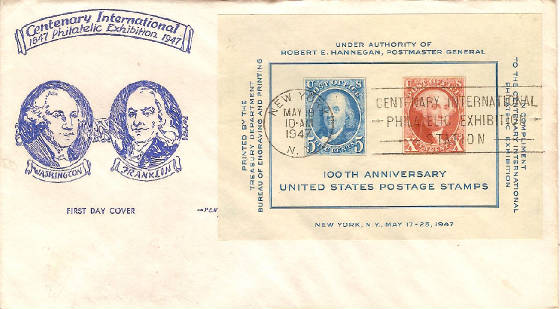
Scott #948, issued May 19, 1947, the CIPEX
Souvenir Sheet, graces the first day cover above. The
first two stamps of 1847, Scott #'s 1 and 2, are reproduced for the 100th anniversary of their issue. Below are the four official souvenir poster stamps for CIPEX printed
by the American Bank Note Company in 1947. Red 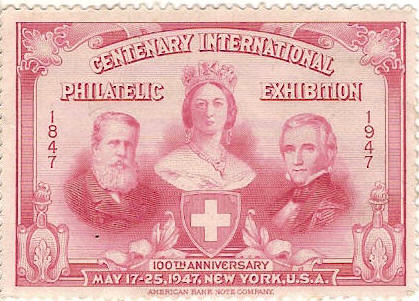
Green 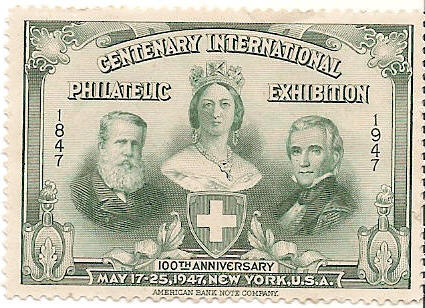
Purple 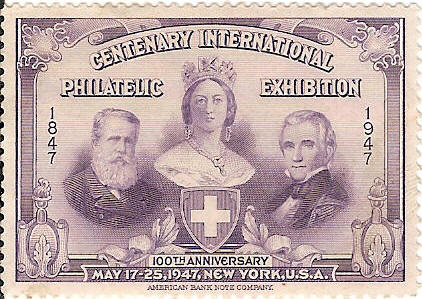
Blue 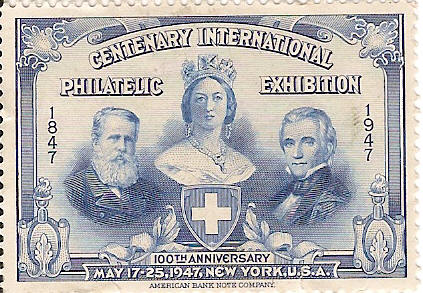
Read more about CIPEX when you click any image
above. 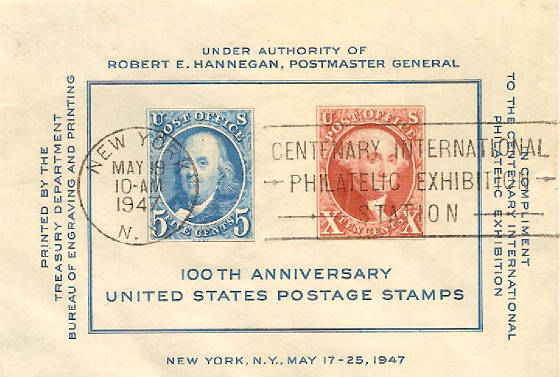
It was one of the most spectacular events in the
history of philately.
The Packet Mixture - Starting the JourneyOne of the greatest moments of all for every young stamp
collector is when mom or dad brought an envelope like this one home from the department store. 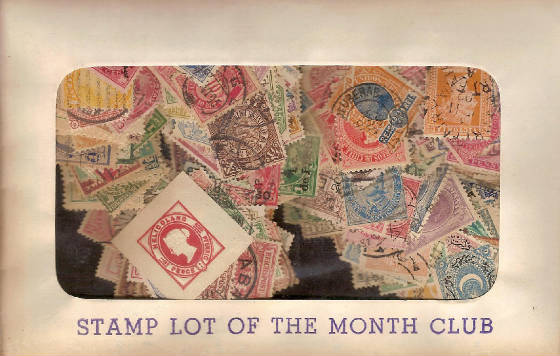
It's called "The Packet Mixture".
It's filled with the stamps of the world ready
for the young collector's album, including many great hours of learning and excitement visiting the countries of the earth
from his or her chair Below, a nice packet
mixture of United States stamps. 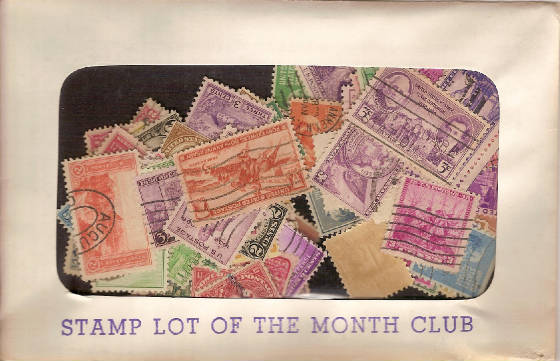
The packet mixture is the beginning of the
journey for young stamp collectors. Each stamp
held in the hand of the young collector is a small piece of the nation it represents. The two packet mixtures above, from my collection, were sold to collectors in the early 1960's and
have never been opened.
Wednesday, May 24, 2017
Free Beer ?When beer is transported in Washington State this stamp
is, or was, applied. 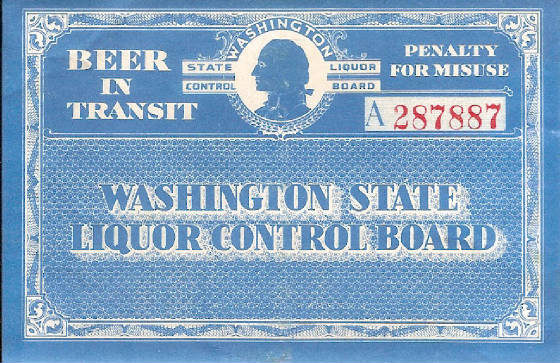
Is it a control number, a serial number or
both ?

Click either image for more.
Tuesday, May 23, 2017
The Crucifix by Cimabue at Santa CroceThe Crucifix by Cimabue at Santa Croce (c. 1265) is a
wooden crucifix, painted in distemper, attributed to the Florentine painter and mosaicist Cimabue, one of two large crucifixes
attributed to him. 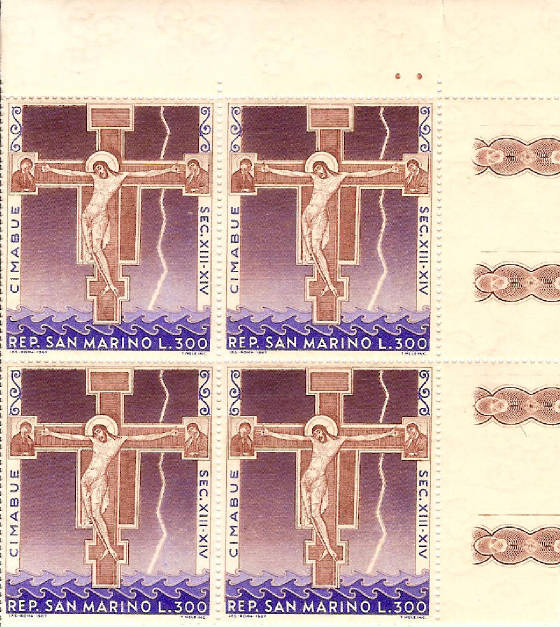
Issued December 5, 1967, San Marino Scott
#676 depicts this majestic work of art, nearly lost by the terrible flood of 1966 that destroyed or severely damaged thousands
of priceless works of art. 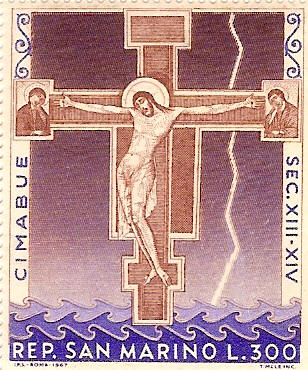
The work was commissioned by the Franciscan
friars of Santa Croce and is built from a complex arrangement of five main and eight ancillary timber boards.
It
is one of the first Italian artworks to break from the late medieval Byzantine style and is renowned for its technical innovations
and humanistic iconography. The actual Crucifix
by Cimabue. 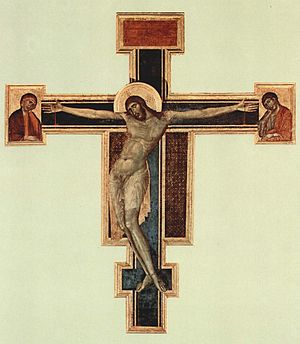
The work has been in the Basilica di
Santa Croce in Florence since the late thirteenth century, and at the Museo dell'Opera Santa Croce since restoration following
flooding of the Arno in 1966. It remains in poor condition despite conservation efforts.
Monday, May 22, 2017
Jordan & The Peacemakers of the WorldJordan issued this souvenir sheet January 5, 1967, fifty
years ago. 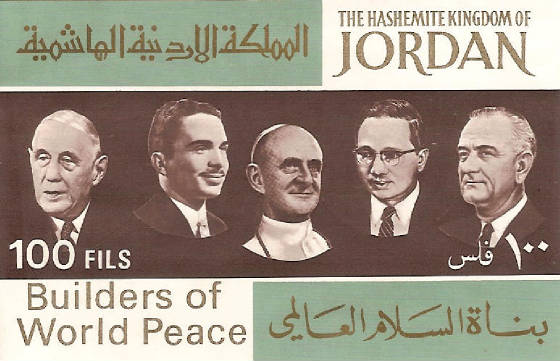
The five men honored are left to right Charles
DeGaulle, King Abdullah of Jordan, Pope Paul VI, Dag Hammarskjold and Lyndon Johnson. Scott #534K, imperforated, 99x64mm.

Jordan, officially The Hashemite Kingdom of
Jordan, is an Arab kingdom in Western Asia, on the East Bank of the Jordan River. Jordan is bordered by Saudi Arabia to the
east and south; Iraq to the north-east; Syria to the north; Israel, Palestine and the Dead Sea to the west; and the Red Sea
in its extreme south-west.
Jordan is strategically located at the crossroads of Asia, Africa and Europe.
The capital, Amman, is Jordan's most populous city as well as the country's economic, political and cultural center. Jordan is a friend to Israel, the United States and the world.
Sunday, May 21, 2017
New York 1862Sylvanus Miller's letter was targeted. A target cancellation on the three cent Washington of 1862.
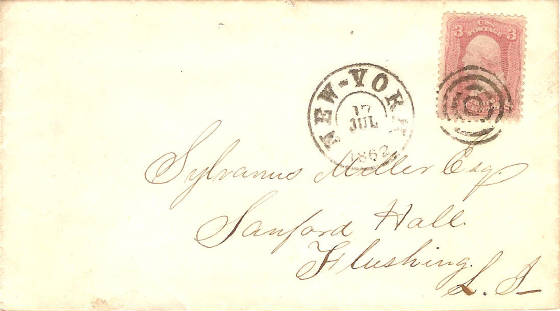
Scott #66 ?, rose perf 12 (though resembles
#64b), issued 1862, with a target cancel and nice New York double circular date stamp postmark of July 12, 1862, a little
more than a year after the Civil War began on April 12, 1861. 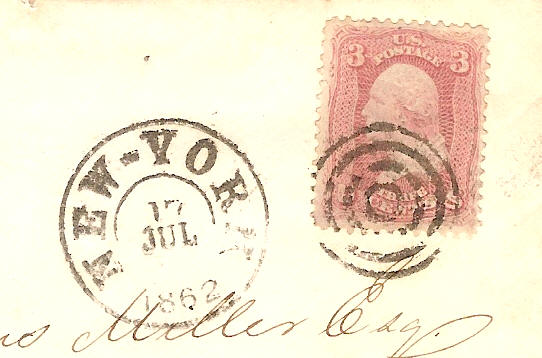
Don't know much about Sylvanus Miller Esq.,
but he may have been the current owner of Sanford Hall, formerly the home of Nathan Sanford of Flushing Queens, New York. 
Since the 1800s, Flushing has had a Sanford
Avenue — it has never received a number. It was named for Nathan Sanford, also the Chancellor of the State of New York,
who purchased several farms east of Jamaica Road, now known as Kissena Boulevard, and built some of the cottages that now
comprise the picturesque Waldheim enclave. Sanford’s 1836 mansion, Sanford Hall, now the Windsor School, can still be
found on Sanford Avenue between Kissena and Main.
Sanford was also a US Senator. He attended Yale University, studied
law, became an attorney in 1799 and practiced in New York City. 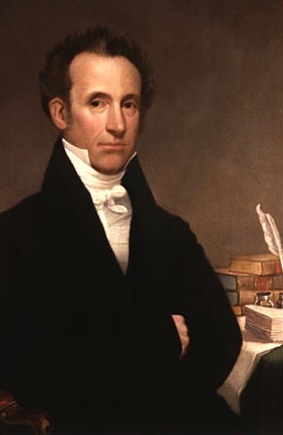
In 1802 he was appointed a US Bankruptcy Commissioner
he was US Attorney for the District of New York from 1803 to 1816. Sanford served in the New York Assembly from 1808 to 1809 and again in 1811, serving as Speaker in his final
term. From 1812 to 1815 he served in the New York Senate. In 1815 he was elected to the US Senate as a Democratic-Republican
and served one term, 1815 to 1821, also serving as Chairman of the Committee on Commerce and Manufactures from 1817 to 1821,
the Committee on Naval Affairs from 1817 to 1819, and the Committee on Finance from 1819 to 1821. In 1821 Sanford was a Delegate to the state constitutional convention, and introduced the amendment
which abolished property ownership as a qualification for voting. He served as state Chancellor (a judicial office) from 1823
to 1826. In 1824 Sanford received 30 electoral votes for Vice President, second to John C. Calhoun's 182. In 1825 he was again elected to the US Senate, this time as an
Adams candidate (later an Anti-Jacksonian), and served from 1826 to 1831. From 1826 to 1827 he was Chairman of the Foreign
Relations Committee. After his second period
of service in the Senate Sanford practiced law in Flushing until his death from tuberculosis. He was married three times and
many of his descendants were prominent, including author Herman Melville and Civil War General Henry Sanford. Here's a nice view of the four concentric target cancel. The stamp
resembles Scott #64b, rose pink.
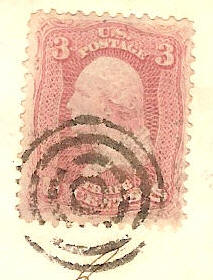
And the circular date stamp postmark.
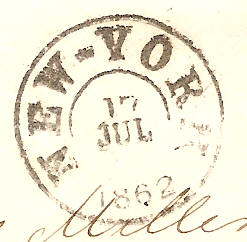
Great cancels like these are not rare, but
they are scarce and can put a dent in your wallet.
Saturday, May 20, 2017
Guatemala & The Central American Expo 1897Printed in 1897, this beautiful example of Guatemalan
postal stationary is not easy to find today. The
stamp, Scott #64 twelve Guatemalan centavos, on the right, is imprinted on the stationary in the same fashion as revenue stamped
paper as used by the banks and was printed by the American Bank Note company. The illustration on the right is the majestic Guatemala City Railway Station. 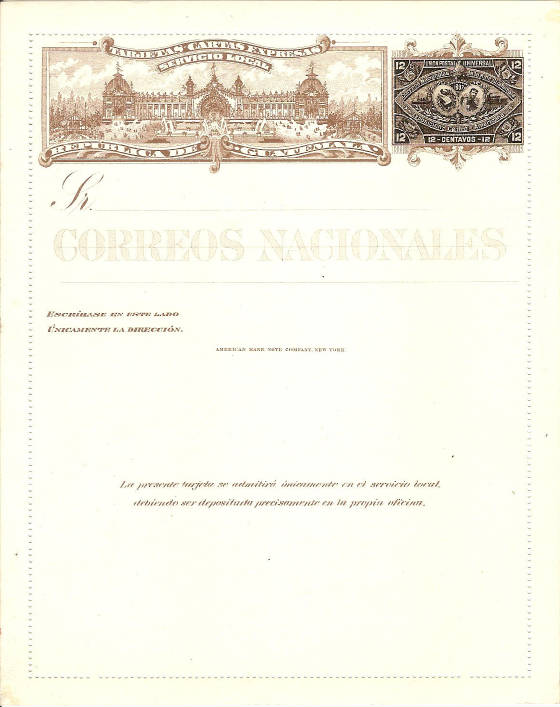
Another view of the railway station and Scott
#64. The stamp, printed January 1, 1897, was
issued for the Central American Exhibition held in Guatemala City. The stamp's illustrations include a steamship, arms, portrait of Pres. J. M. Reyna Barrios and the locomotive.
Arms of El Salvador, Honduras, Nicaragua and Costa Rica are in the corners. 
The lower left inscription translated is "you
write the address here only". Note the
"American Bank Note Company, New York" inscription at the bottom of the address section. 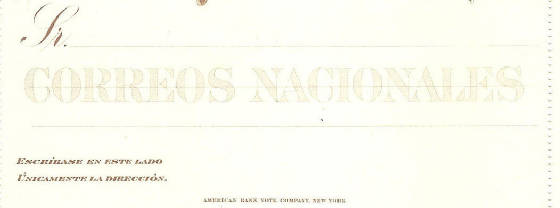
The inscription translated reads, "This
card is for local service only and must be deposited precisely in the office, cards express local service." 
Expo postal stationary, like this example,
is hard to come by.
Thursday, May 18, 2017
Russia 1857 - 1888The stamps of Russia are among the most beautiful works
of art in the entire world. Here are the Imperial
Eagles and Post Horns, and their historical cancellations, from the mid to late nineteenth centrury from my collection. 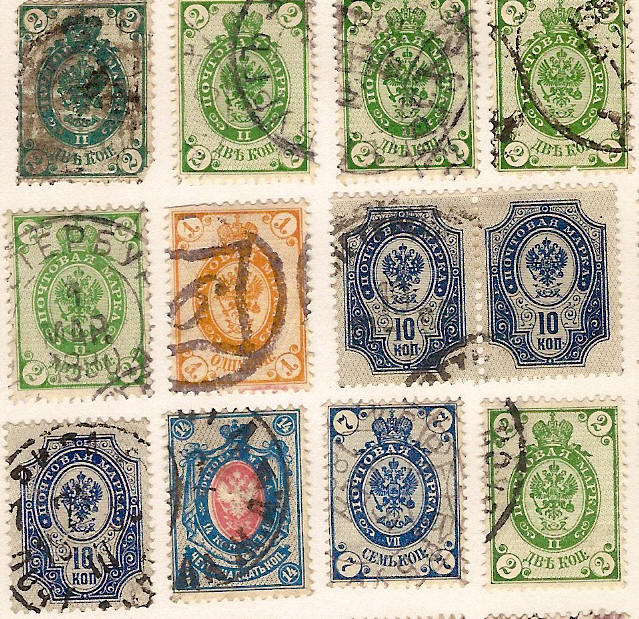
A full page of Imperial Eagles. 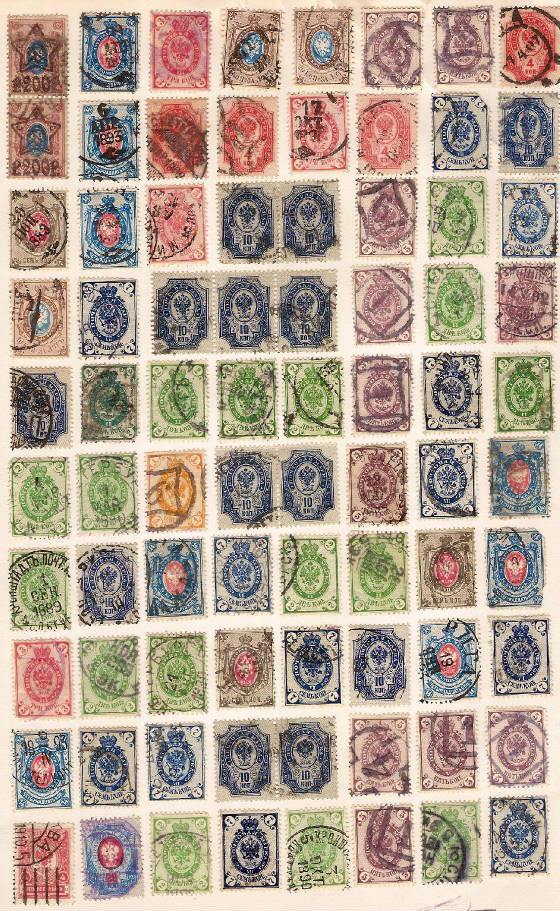
Another view. 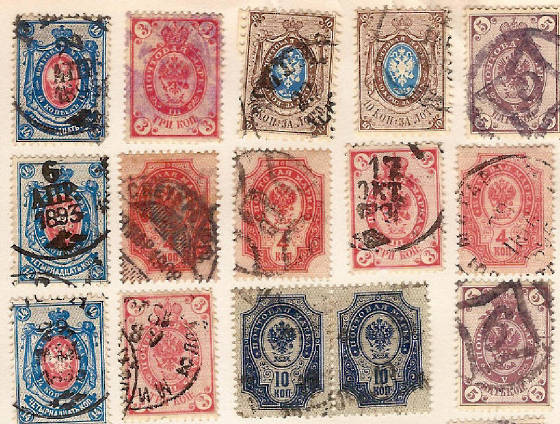
Thank you for visiting today.
Wednesday, May 17, 2017
Will Rogers Missed His FlightWill Rogers (November 4, 1879 – August 15,
1935) was great. Cowboy, comedian, actor, philosopher. This scarce cover represents the inauguration of passenger service
to France on June 28, 1939 and is a memorial to Will.
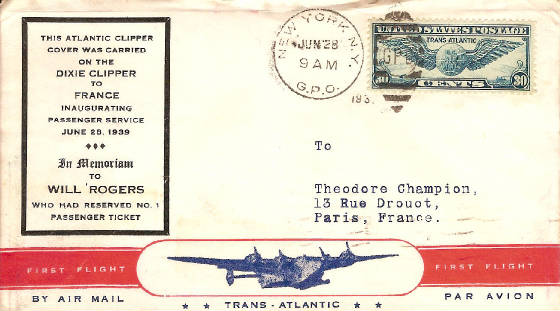
The flight had been planned for a long time. 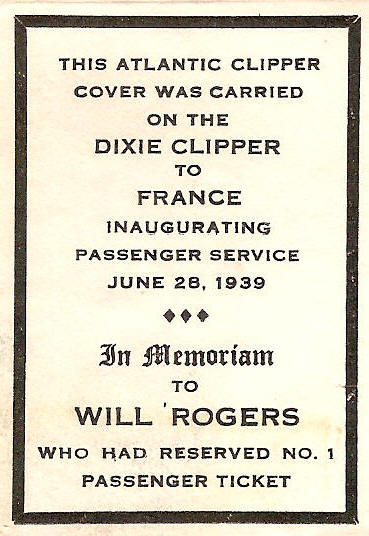
Will was killed in a plane accident in Alaska
with his pal and fellow aviator Wiley Post four years earlier. Will had purchased the first ticket for the Dixie Clipper years in advance of the flight like an astronaut
waiting to board the first flight to the moon.
The
New York, N.Y. circular date stamp of June 28 has the initials G.P.O. (general post office) cancelled by the G.P.O. oval "shoeprint"
cancellation and the number 193 which may have represented the cancellation machine. The stamp attached to this great First Flight cover is the "Winged Globe" Scott #C24 issued
May 16, 1939. 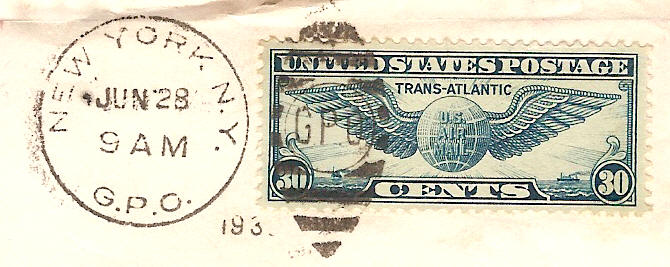
The plane arrived in Marseille June 30, 1939
as shown on the reverse with the arrival circular date stamp. 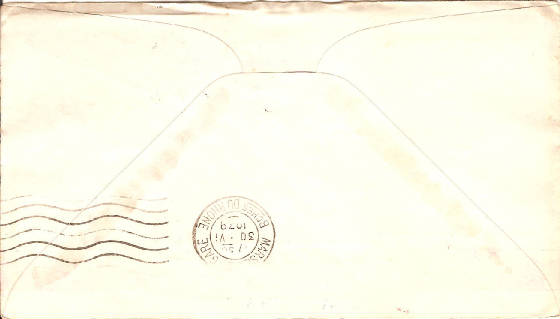
And an enlarged view of the Marseille arrival
cancel with six wavy bars and the circular date stamped machine cancellation. 
My nation, and the world, should always love
and remember Will Rogers for his great wisdom and remarkable sense of humor. He was a great American. 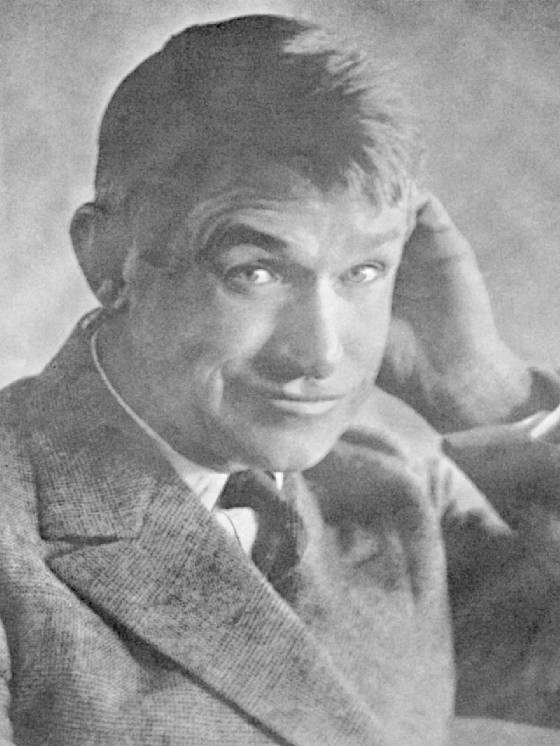
Tuesday, May 16, 2017
First Flight to SuvaSuva is the capital, second largest municipality and largest
municipality with city status in Fiji, located on the southeast coast of the island of Viti Levu, in the Rewa Province, Central
Division. On November 5, 1941 at 5pm the first
F.A.M. (Foreign Air Mail) flight to Suva departed from Los Angeles, California. 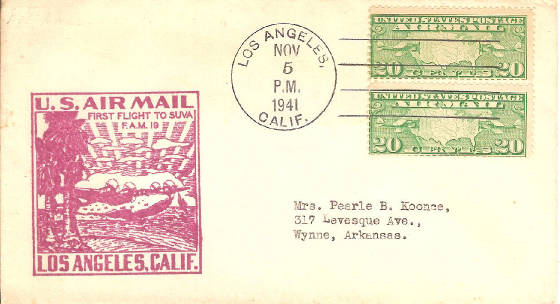
This scarce first flight cover bears the historical
cachet commemorating the event, the circular date stamp, and the four bar machine cancel over a beautiful pair of green Scott
#'sC9 issued in 1927 featuring a map of the United Statesand two mail planes. 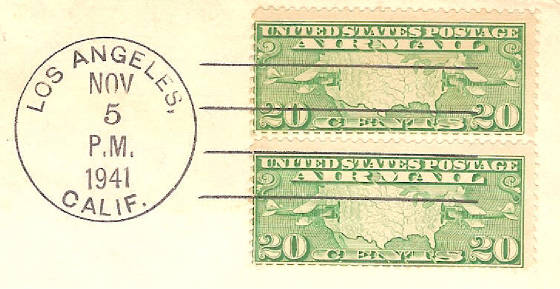
And the reverse cover with the Suva arrival
circular date stamp four days later on November 9, 1941 at 4pm. 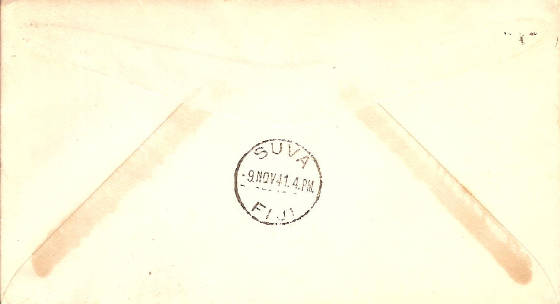
Details of the Suva / Fiji circular date stamp. 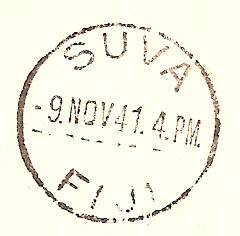
And another look at the great wine-illustrated
cachet of a sea plane.
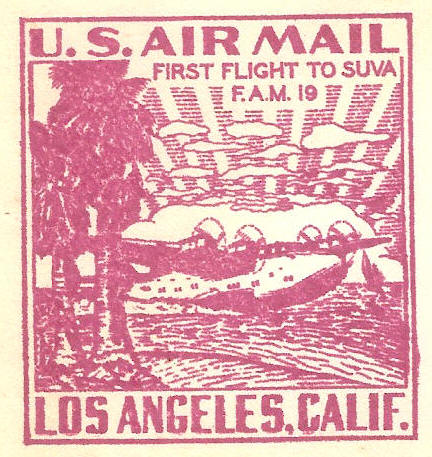
First flight covers are a great philatelic
topical variety. Some flight covers can be quite
expensive and very challenging to find, especially so in aerophilately.
Monday, May 15, 2017
Banking At The Airport For The First TimeThe Empire Trust Company of New York, founded on March
1, 1904, opened a bank inside LaGuardia Field Municipal Airport on September 8, 1941. The event was celebrated with this souvenir cachet with the New York circular date stamp and seven
bar line machine cancel that ties Scott #C25 rotary press printed, perforated 11x10.5 twin-motored transport plane to the
upper right corner. 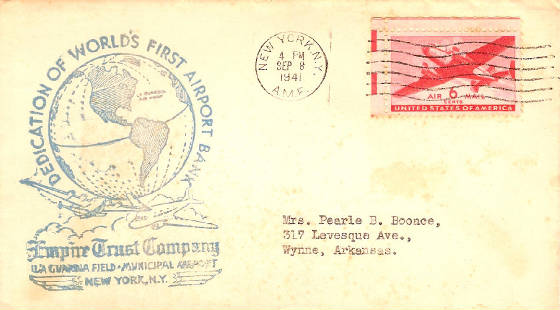
Yet another view of Scott #C25 and the cancellation. The two red vertical bars to the left of the stamp in the margin
are electric eye guides that kept the paper aligned on the rotary press. The stamp happened to be removed from the top left corner of the full sheet and nicely retained the
margin selvage with the perforations and electrice eye guides. Cool ! You can also see the red horizontal plate line at the
top. Nice !
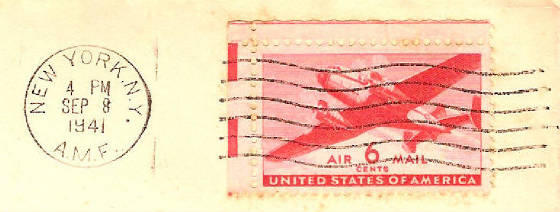
And another view of the nice cachet. Note the
initials A.M.F. at the bottom of the circular date stamp. The intitials stand for "Air Mail Field". 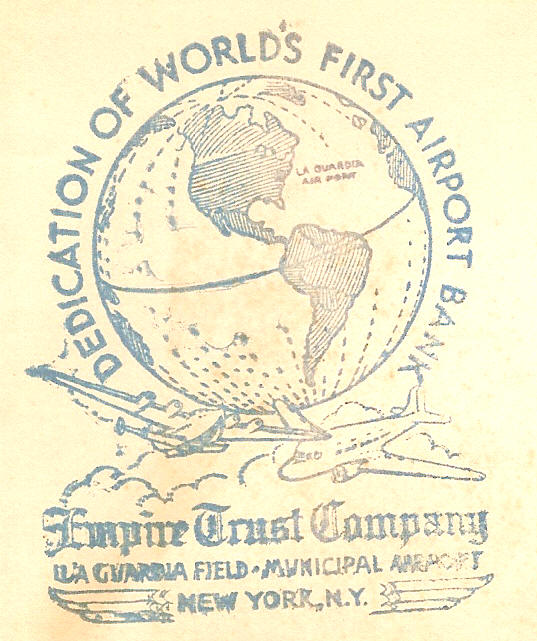
This is an unusual and scarce aviation cover
commemorating a mundane, yet notable event: the opening of a bank inside of an airport for the first time in history. Oh Boy
!
Sunday, May 14, 2017
The First Rotary-Wing Aircraft Mail Route - June 6, 1939On May 25, 1935,an experimental autogiro air mail delivery
service was tested linking Camden’s Airport with Philadelphia’s newly opened General Post Office. 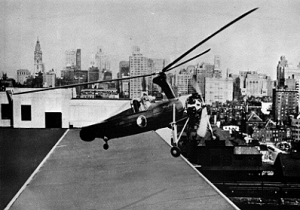
Eastern Airlines’ Kellett KD-1 Autogiro
takes off from the roof of the Philadelphia’s Post Office at Thirtieth and Market Streets in 1939. 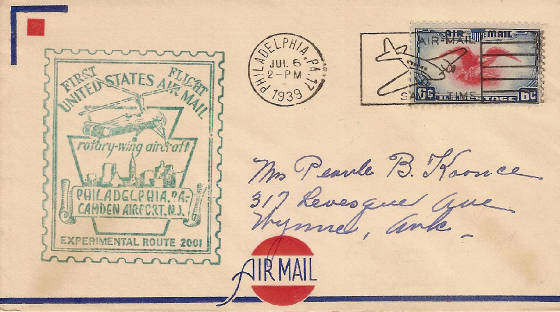
The U.S. Army Air Corps purchased a Kelletts’ KD-1 autogiro (pictured in the cachet), and Eastern Airlines
used it to deliver mail from Philadelphia’s Thirtieth Street Post Office to the Central New Jersey Airport in Camden,
New Jersey.
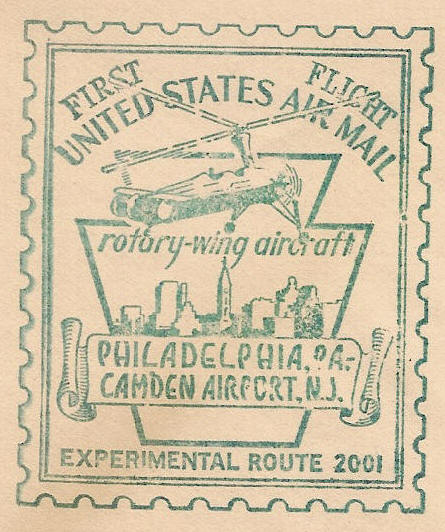
This historic event represented the first Autogiro used by the United States Postal Service to carry mail.

On July 6, 1939, the postal service began using an Autogiro aircraft to fly mail between the Central Airport at
Camden, New Jersey, to the roof of the main Philadelphia post office.
Scott #C23, issued on this day, May 14, 1938, is the six cent airmail stamp perforated 11 in the
colors of dark blue and carmine and cancelled with the Philadelphia circular date stamp of July 6, 1939, 2pm, and the beautiful
barred metered slogan cancel of the passenger airliner with the words "Airmail Saves Time". 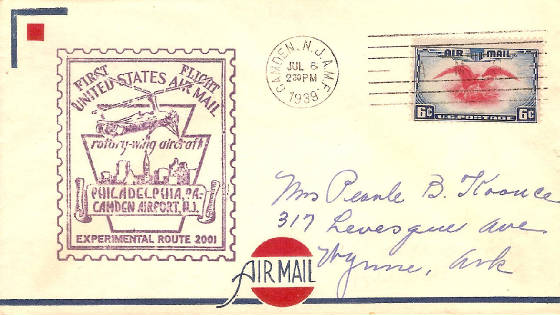
This much acclaimed event occurred in 1939,and
would distinguish Camden Central Airport even more. Just
above, and below, is the Camden, New Jersey cover with the circular date stamp and seven bar machine cancellation of July
6, 1939 2pm across Scott #C23. 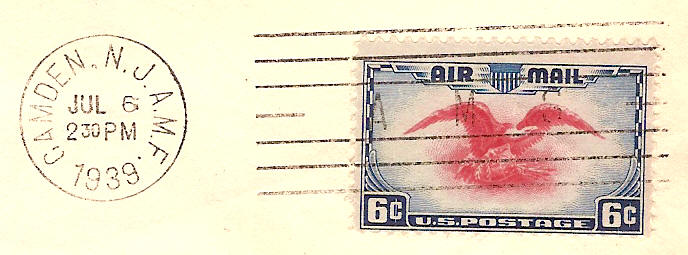
Although experiments had previously been conducted
between the two cities, July 6, 1939 saw the inauguration of daily autogiro airmail shuttle service linking Central Airport
in New Jersey and the roof of the new General Post Office in Philadelphia at Thirtieth, between Market and Chestnut Streets.
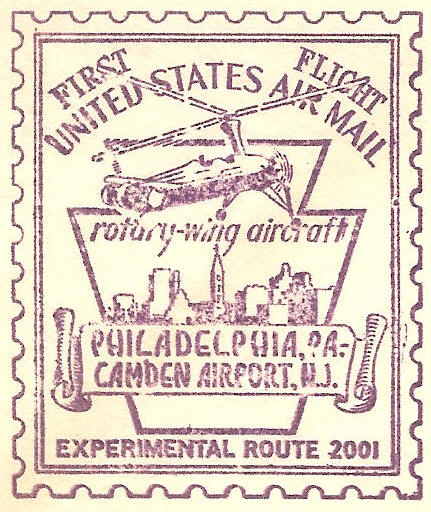
This was the first autogiro mail service
in the United States and would become known as the “world’s shortest air mail route!” 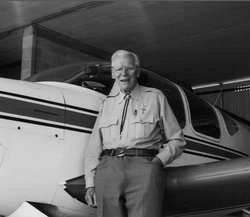
Much-celebrated test pilot John M. Miller (1905 - 2008) flew the philatelic mail on the new rotary-wing aircraft service.
Saturday, May 13, 2017
Baseball
Baseball is a bat-and-ball game played between
two teams of nine players each, who take turns batting and fielding, or chasing the ball in the field. In 1939, the United States Postal Service honored the game of baseball
in Cooperstown, New York with a commemorative stamp honoring the 100th anniversary, or centennial, of baseball in America. Cooperstown is widely regarded as the home of baseball in America. The first day of issue ceremony also coincided with the creation
of the National Baseball Hall of Fame in Cooperstown on the very same historic day of June 12, 1939. 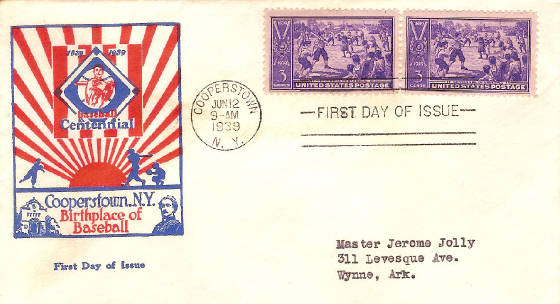
The Baseball Centennial Issue of June 12, 1939
depicts the excitement of a sand lot baseball game as it was played in the last century. 
The rotary press printed, perforated 11x10.5,
violet Scott #855 proudly joins the first day of issue bar cancellation and the Cooperstown circular date stamp applied to
this historic cover on the day of the ceremony. 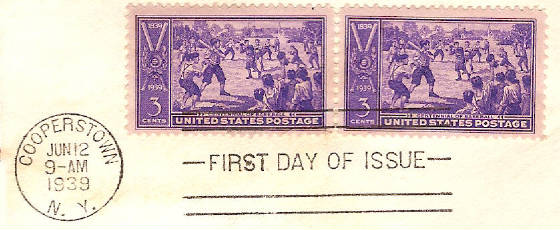
The 1939 Cooperstown cancellation is coveted
throughout the world by collectors of sports on stamps. 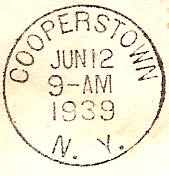
Although the artist is unknown, this cachet
is believed to be the cachet design approved by Stephen Carlton Clark, the founder of the National Baseball Hall of Fame 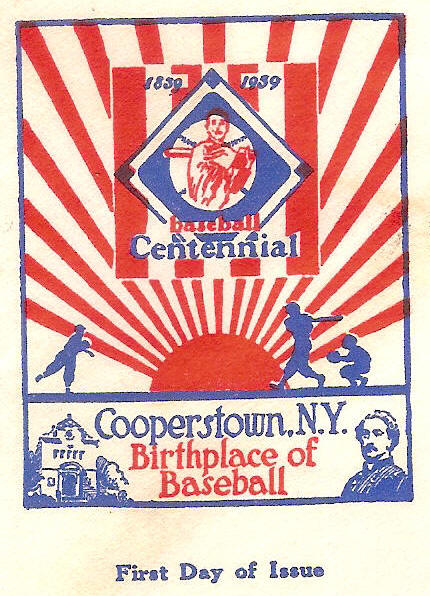
Visit the National Baseball Hall of Fame this
summer. 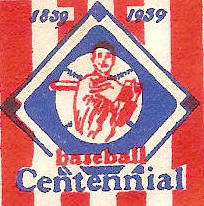
Friday, May 12, 2017
Lufthansa & The First Turboprop Flight To Moscow 1960Lufthansa and the German Democratic Repulic post issued
this first flight cover on March 31, 1960 in Berlin, Germany. 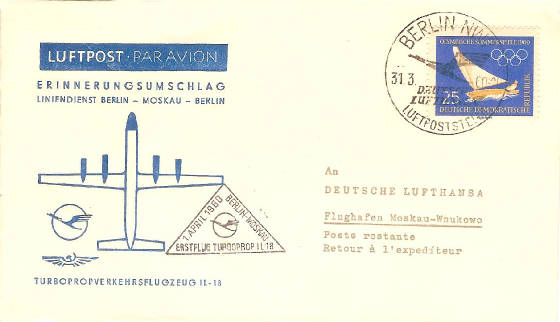
The circular date stamp cancels the January
27, 1960 issued Scott #491 Summer Olympics commemorative stamp featuring sailboating. 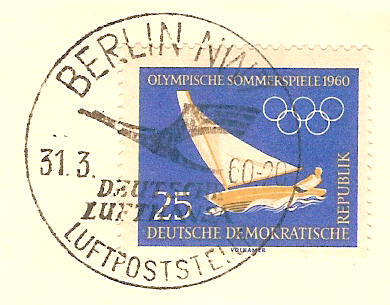
The cachet and triangular date stamp honor
this first historic flight of Lufthansa's turboprop airliner to Moscow. 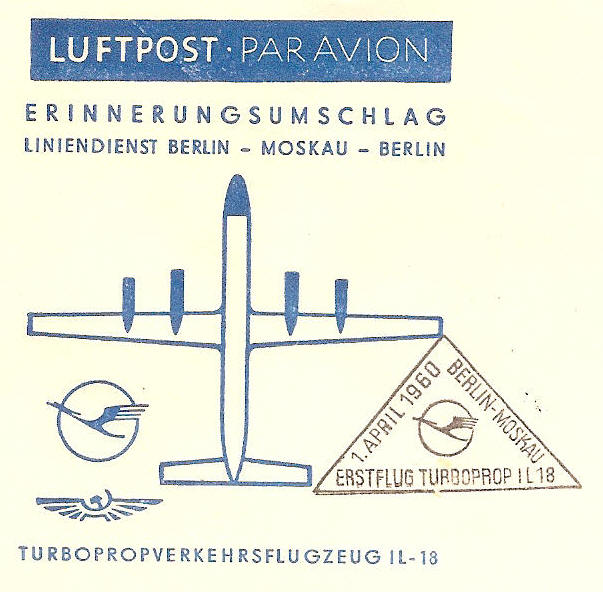
The address. 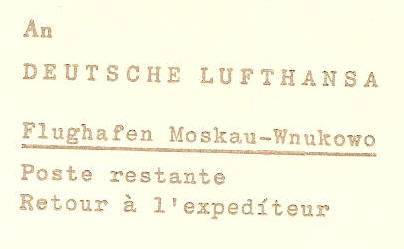
Another view of the cachet. 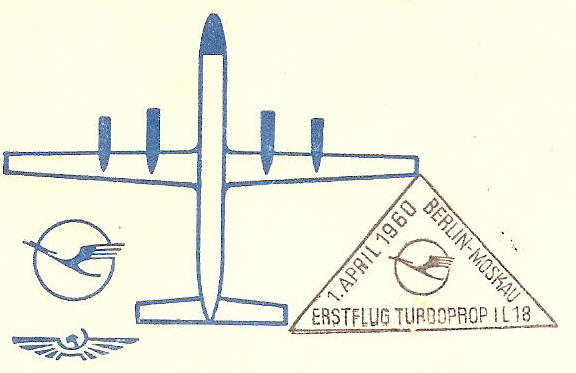
The reverse side. 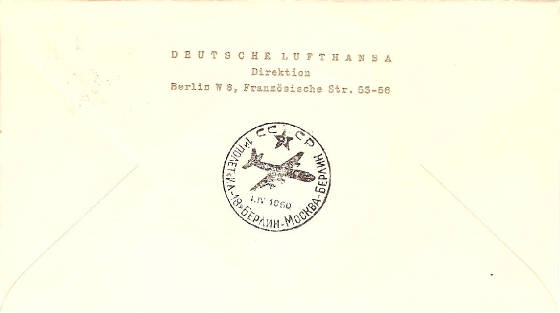
Lufthansa's address and Moscow's circular date
arrival hand stamp cancellation of April 1, 1960. 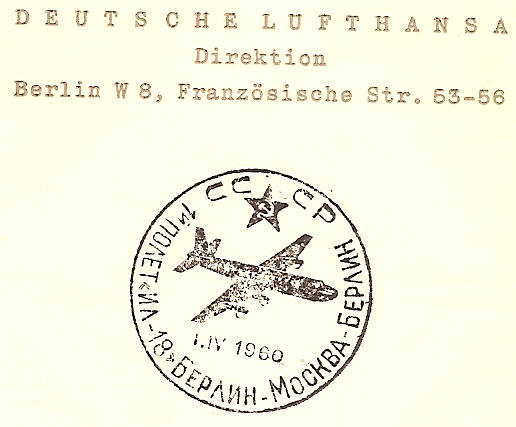
And another closeup of Moscow's circular date
arrival stampof April 1, 1960. 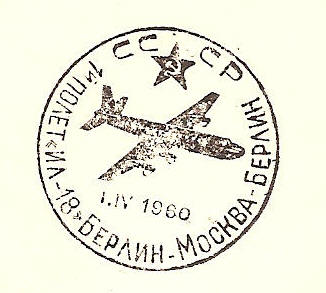
Collecting first flight covers is one of the
most challenging and fantastic topical fields in stamp collecting. It's one of the greatest ways of all to discover and learn about the aviation history of our planet.
Cuban CigarsThe cigars of Cuba are considered by cigar enthusiasts
to be the finest in the world. On August 28,
1939 the government and postal authority of the beautiful island of Cuba issued three stamps representing the importance of
Cuba's most coveted export. The stamps represented
on this beautiful first day cover include, in vertical pairs, Scott #356 one cent yellow green Giboney Indian and Cigar, Scott
#357 two cent red cigar and globe, and Scott #358 three cent bright ultra tobacco plant and cigars, all watermarked and perforated
eleven. 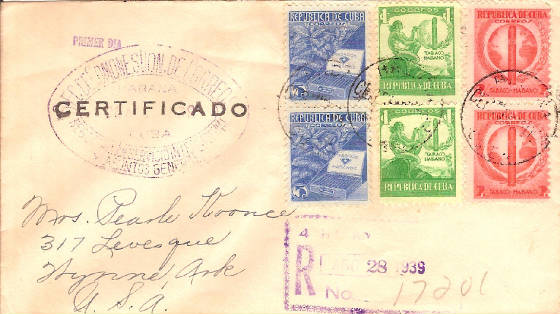
The Catalonian words "Primer Dia"
(first day) are prominently displayed and imprinted above the certificated cachet issued in Havana, Cuba August 28, 1939. 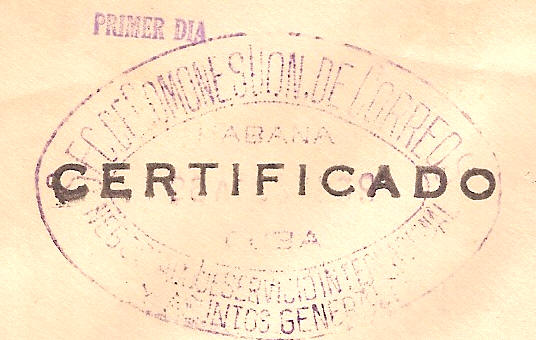
Another view of Scott #'s 356, 357 and 358
with the circular date stamped cancellations from Havana. 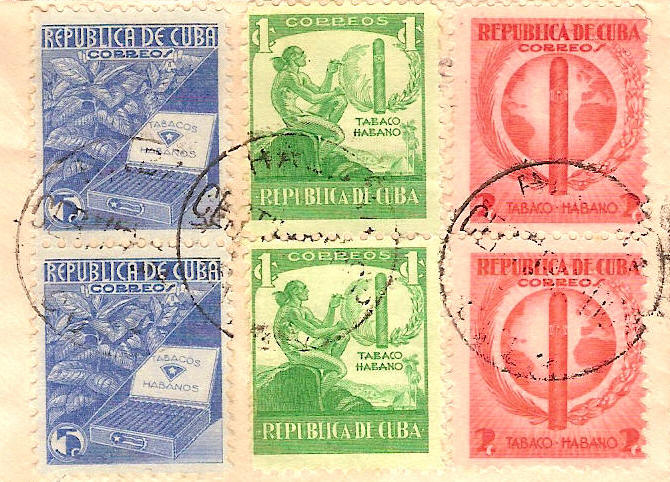
The receipt registered mail stamp of August
28, 1939 assigned No.17201. 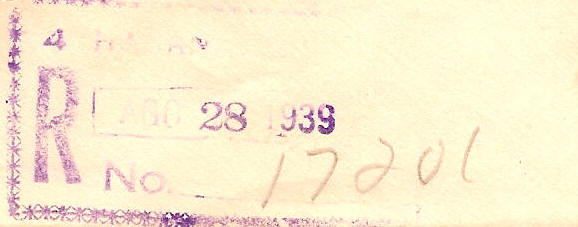
The first day cover's reverse side with arrival
circular date stamps, to include the Havana registered stamp. 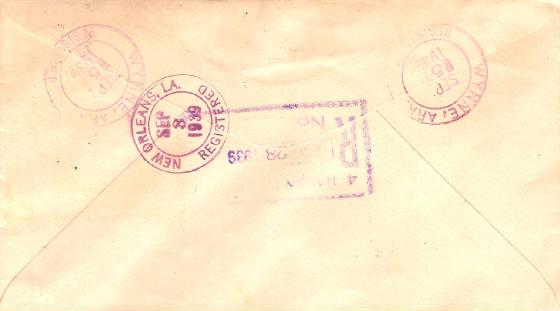
In the center, note the August 28, 1939 registered
stamp. Just above and to the left of the registered
hand stamp is the New Orleans, Louisiana arrival circular date registered hand stamp of September 3, 1939, which took six
days to arrive from Havana, Cuba. And to the
left and right of the Havana and New Orleans registered hand stamps, two Wynne, Arkansas registered arrival circular date
hand stamps of September 5, 1939, two days out of New Orleans and eight days from Havana. 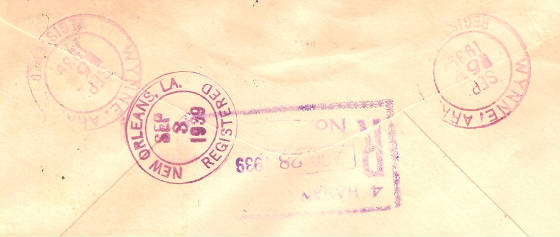
Another beautiful Cuban first day cover celebrating
the cigar with a block of four of Scott #356. 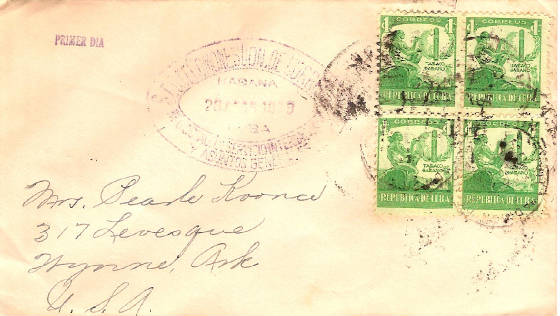
The Cuban Cigar is considered
to be the world's finest. Cuban cigars are very difficult to aquire So are these historic examples of Cuban philately. Cuban cigar stamps, as a topical stamp collectible, are an extraordinary challenge for any philatelist.
Wednesday, May 10, 2017
The Royal Train 1939Seventy eigth years ago in 1939, King George VI and Queen
Elizabeth enjoyed a
thirty
day tour of the New World on their own train. This is considered to be one of the scarcest and most desirable
of all of the Royal Train covers because the postmark represents the Royal Family's first day of entry into the United States. The stamp is the 1939 Washington Inauguration
Issue, Scott #854, perforated 11, flat plate printing in bright red velvet, tied to the cover with the official United
States circular date stamp and bar cancellation of the R.P.O. (railroad post office). The stamp celebrates the sesquecentennial
(150 years) of George Washington's inauguration as our nation's first president, 1789-1939, and illustrates Washington taking
the oath of office. The Royal Train had a post office on board and special cancels could be obtained.
This
was the first visit to North America by a reigning British monarch. The royal couple and
their entourage had arrived in Quebec City on May 17 aboard
the Canadian Pacific ocean liner S.S. Empress of Australia.
Two twelve car trains transported the Royal Family, their staff, security detail, and
the press.
Each
train included six cars from Canadian National Railway and six from the Canadian
Pacific.
On June 8, 1939,
their Royal Train arrived in Washington DC via the Pennsylvania Railroad.
On the weekend of Saturday and Sunday,
June 10 and 11, the royal couple were guests
of Franklin and Eleanor Roosevelt at their private estate in Hyde Park NY.
In contrast to
the official state dinner in Washington DC three days earlier, their time at Hyde Park
was relaxed
and informal.
The President of the United States treated the King and Queen of England to a picnic
on the
front porch of Top Cottage, where (to the horror of FDR's mother) he served
them hot dogs. This is an actual black and white photograph
of the Royal Family attached to the Royal Mail cover, on photographic paper. If Franklin and Eleanor had gone to London they would have been
served fish and chips.
9:47 pm cdt
Tuesday, May 9, 2017
His "End" Is Inevitable - The Ugly Sardonic Side of WarJohn N. Lawrence was one of the great patriotic cachet
makers during the 20th century. This patriotic
cover depicting Uncle Sam booting Japanese Emperor Hirohito is a sad reminder of a terrible war. 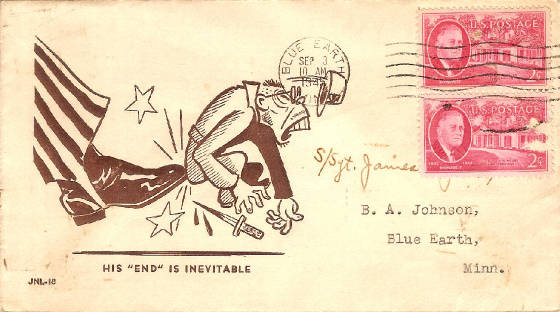
The illustration and the intials JNL for John
N. Lawrence. 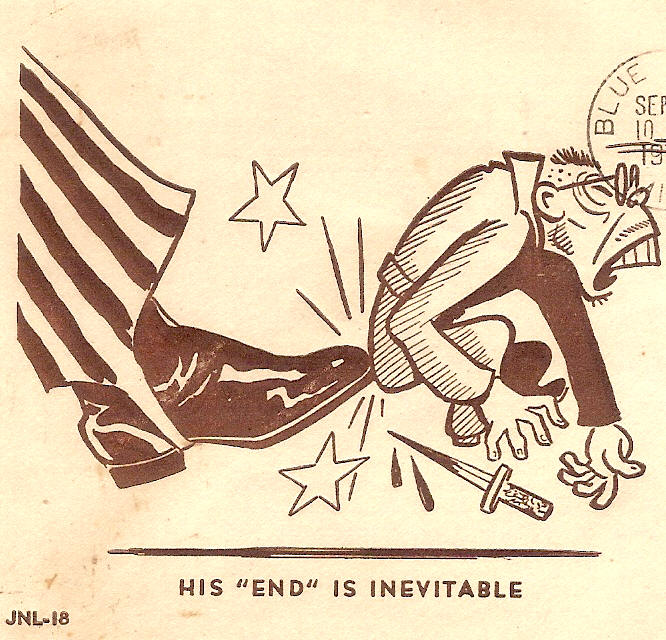
Blue Earth, Minnesota September 3, 1945 circular
date stamped cancellation and wavy bar lines tie the pair of Scott #931, two cent carmine rose, portrait of President Franklin
Delano Roosevelt and the "Little White House" in Warm Springs, Georgia to this World War Two patriotic cover. 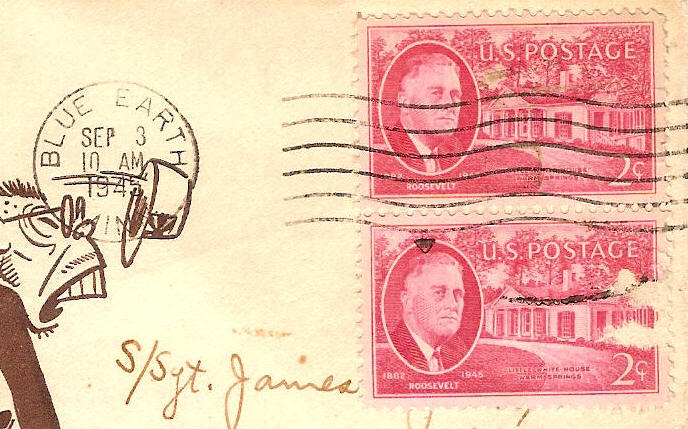
These covers are historical, scarce, and offensive
to our friends in Japan in this day and age. War
is ugly. Let's all be friends and create a
greater world with peace, understanding and stamp collecting.
Monday, May 8, 2017
The Hamburg - America Line 1904The Hamburg-Amerikanische Packetfahrt-Actien-Gesellschaft,
often referred to in English as Hamburg America Line, sometimes Hamburg-American Line, Hamburg-Amerika Linie or Hamburg Line,
Hamburg American Packet-shipping Joint-stock company, was a transatlantic shipping enterprise established in Hamburg, Germany,
in 1847. 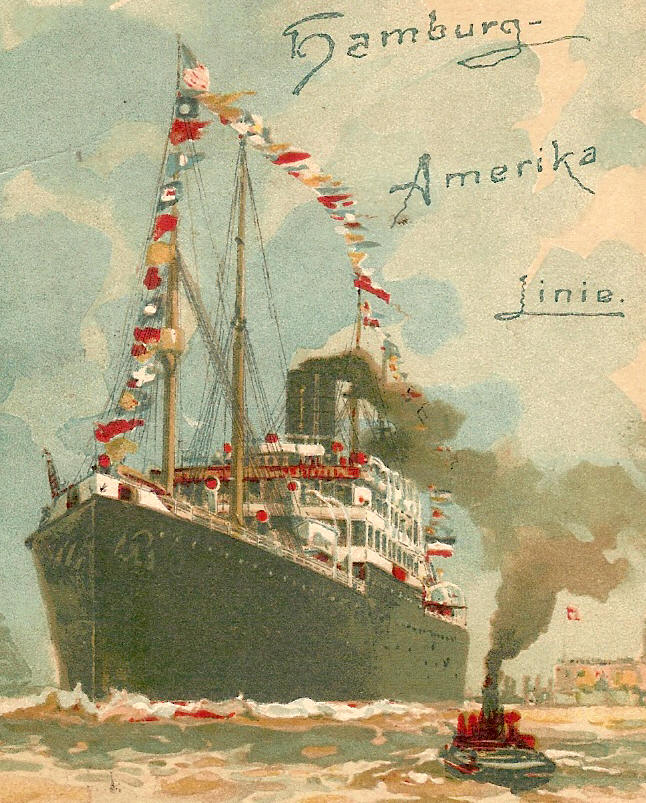
From 1904, a postcard from the Hamburg - America
Line 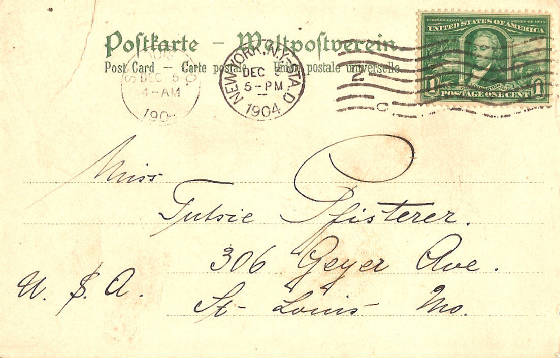
The cancel is an International machine cancel
tied to the 1904 issued Scott #323 featuring a portrait of Robert R. Livingston who was an American lawyer, politician,
diplomat from New York, and a Founding Father of the United States. The lines point down when near the circular postmark, characterisitc of the International. There is a large gap between the lines and the postmark. The space
for the numerical die "2" takes up 1 line only. International killers often had an extra diespace near the bottom,
the letter "c" in this example. The
"2" is the machine number and the "C" is the service letter. The "2" identifies the individual
machine as a check on the canceling clerk at the hour in the post mark. In large offices with many machines, improperly cancelled
mail can be traced to the responsible clerk with this identifying numeral. "C" stands for “Collected” from letterboxes as opposed to “Dropped”
in the post office mail slots.

The circular date cancellation on the left
indicates that the postcard was received in St.Louis, Missouri at 4 AM on December 5, 1904. The International machine cancellation on the right indicates in the circular date stamp that the
postcard was mailed from New York, New York Station "D" on December 3rd at 5 PM in 1904. And the Postcard 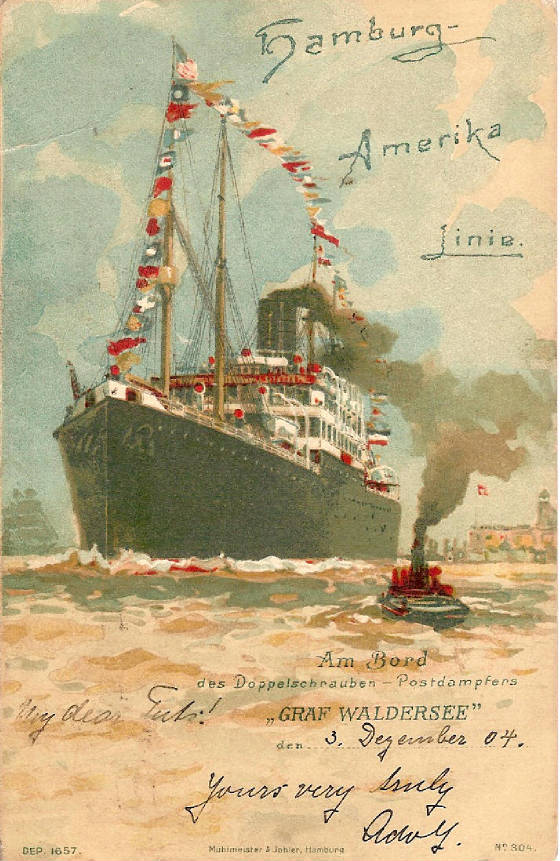
The Salutation from the Graf Waldersee, vessel
named after the German General who died in 1904. 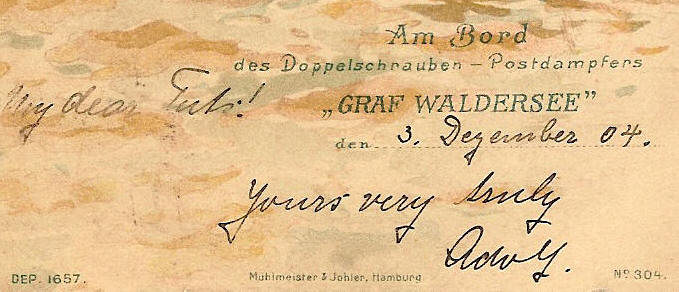
Muhlimeister & Johler were printers in
Hamburg. Their postcards are scarce. Some
quite expensive. The postcard is a fine example
from this period in history.
Sunday, May 7, 2017
This World's First Commemorative Stamped Envelope - Philadelphia 1876The Centennial International Exhibition
of 1876, the first official World's Fair in the United States, was held in Philadelphia,
Pennsylvania, from May 10 to November 10, 1876, to celebrate the 100th anniversary of the signing of the
Declaration of Independence in Philadelphia. This is the world's first commemorative stamped envelope. 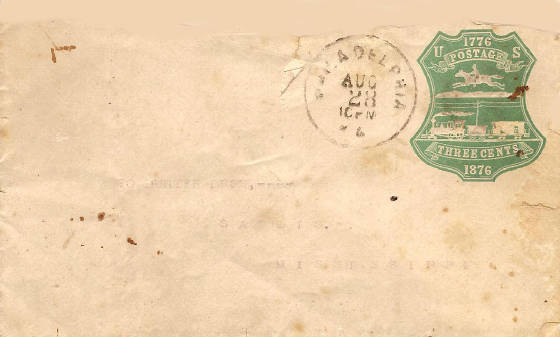
Mail at the Centennial Fair was processed
either at the Centennial Post Office in Philadelphia or on one of two railway post office cars at the fair. Post marks from the centennial post office are fairly common on
Scott #U219. 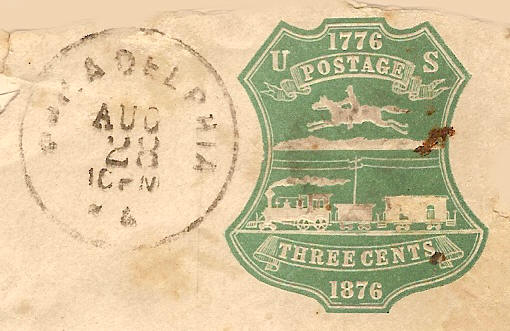
RPO markings from the Centennial are fairly
scarce. There are no reported counterfeits of
the 1876 Centennial envelopes. 100 Years Later
Scott #U582 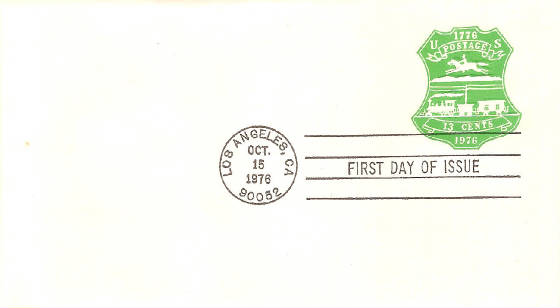
And Scott #U582 First Day Cancellation 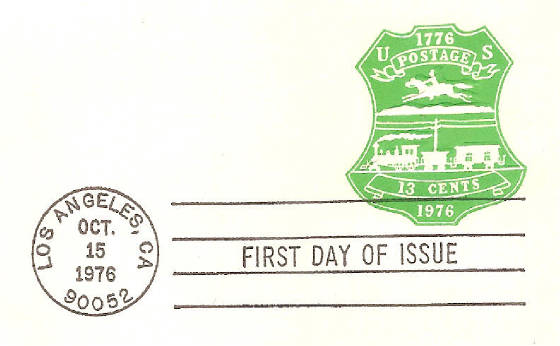
Numerous fake postmarks are known on the various
forgeries of the Centennial dies. Here
are few examples. 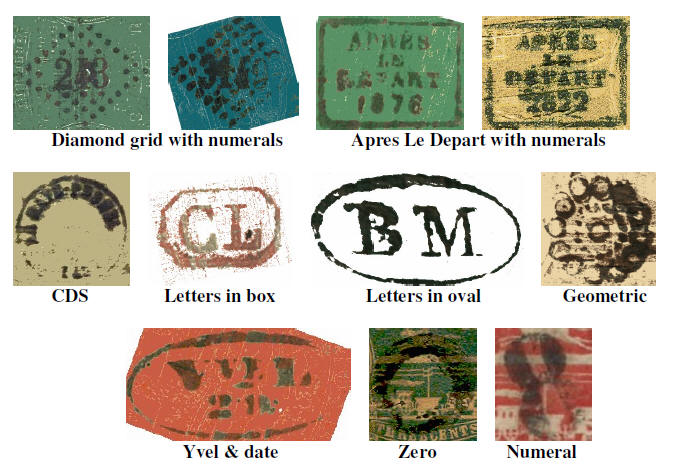
Here's a nice descriptive brochure from ArtCraft
about the bicentennial 13 cent first day cover of 1976, Scott #U582 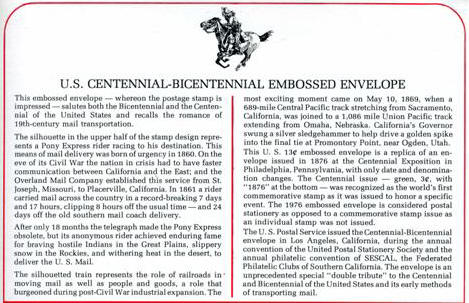
Pros will notice that Scott #U219 is the single
line type. The 1876 cover is tough to find
and a great exhibition piece.
Saturday, May 6, 2017
The Beautiful Russian Bird That Fell From The RoostI've discovered what appears to be Russia Scott #62
or 81, 15 kopec red brown & deep blue, vertically laid or wove paper. The center is well-shifted, about 20 degrees or so to the right.
Perf .14 unwatermarked issued 1909-12. The Imperial Eagle & Thunderbotls Across The Post Horns Appears to be unused under the scope, no gum, never hinged.
The center omitted, center
inverted (Scott #62a) and center doubled are represented in the catalog for this design (A11). The
shift is not recognized in the catalog. The stamp was hidden behind
rows of Georgian and Transcaucasian imperforates
within an old manila stock card sleeve. The beautiful bird
that fell from the roost.
Friday, May 5, 2017
Soviet Georgia & The Overprints of 1923 - The Scarce Green 5000 RubleAnd again, Georgia is a country in the Caucasus region
of Eurasia. Located at the crossroads of Western Asia and Eastern Europe, it is bounded to the west by the Black Sea, to the
north by Russia, to the south by Turkey and Armenia, and to the southeast by Azerbaijan. The capital and largest city is Tbilisi.
It's part of Transcaucasia.
Georgia was formerly a province of the Russian Empire and later a part of the
Transcausian Federation of Soviet Republics.
The stamps of Georgia were replaced in 1923 by those of the Transcaucasian
Federated Republics.
On March 1, 1994 Georgia joined the Commonwealth of Independent States.
Issued
in 1923, the now-scarce Scott #46, Soviet Socialist Republic unwatermarked imperforate green 40,000 ruble on 5000 ruble surcharge
printed in black.
Industry & Agriculture And once again, the inperforates are scarce
and worth more than the perforated stamps. It's
been said that forgeries of the imperforates are not known to have been recorded, therefore, the assumption is that the imperforates
are safe to collect. If you have examples or
links that you'd like to share please send me an email. Have
a great weekend.
Thursday, May 4, 2017
Soviet Georgia & The Overprints of 1923 - The Scarce 1000 RubleGeorgia is a country in the Caucasus region of Eurasia.
Located at the crossroads of Western Asia and Eastern Europe, it is bounded to the west by the Black Sea, to the north by
Russia, to the south by Turkey and Armenia, and to the southeast by Azerbaijan. The capital and largest city is Tbilisi.
It's part of Transcaucasia.
Georgia was formerly a province of the Russian Empire and later a part of the
Transcausian Federation of Soviet Republics.
The stamps of Georgia were replaced in 1923 by those of the Transcaucasian
Federated Republics.
On March 1, 1994 Georgia joined the Commonwealth of Independent States.
Issued
in 1923, the scarce Scott #43, Soviet Socialist Republic unwatermarked imperforate brown 10,000 ruble.on 1000 ruble surcharge
printed in black. Peasant Sowing Grain It has been said that there are no recorded
reprints or forgeries of the overprinted imperforated stamps and, although scarce today, they can be safely collected.
Wednesday, May 3, 2017
Soviet Georgia & The Overprints of 1923 - The Scarce 500 RubleGeorgia is a country in the
Caucasus region of Eurasia. Located at the crossroads of Western Asia and Eastern
Europe, it is bounded to the west by the Black Sea, to the north by
Russia, to the south by Turkey and Armenia, and to the southeast by Azerbaijan. The
capital and largest city is Tbilisi. It's
part of Transcaucasia. Georgia
was formerly a province of the Russian Empire and later a part of the Transcausian
Federation of Soviet Republics. The stamps of Georgia were replaced in 1923
by those of the Transcaucasian Federated Republics. On
March 1, 1994 Georgia joined the Commonwealth of Independent States. Issued in 1923, the scarce Scott #45, Soviet Socialist Republic unwatermarked imperforate
red 20,000 ruble.on 500 ruble surcharge printed in black. Soldier
With Flag They just don't make stamps like these
anymore. Instead of pulling your hair out trying to find them, enjoy them on my blog pages. By the way, the imperforates are considered proofs by some and
were never issued for postage, so they say, and can bring you a nice price if you're selling.
Tuesday, May 2, 2017
More From Georgia the Nation, Industry & AgricultureGeorgia is a country in the Caucasus region of Eurasia. Located
at the crossroads of Western Asia and Eastern Europe, it is bounded to the west by the Black Sea, to the
north by Russia, to the south by Turkey and Armenia, and to the southeast by Azerbaijan.
The capital and largest city is Tbilisi. It's
part of Transcaucasia. Georgia
was formerly a province of the Russian Empire and later a part of the Transcausian Federation of Soviet
Republics. The stamps
of Georgia were replaced in 1923 by those of the Transcaucasian Federated Republics. On March 1, 1994 Georgia joined the Commonwealth of Independent
States. Issued in 1922, Scott #29, Soviet Socialist
Republic unwatermarked imperforated brown 3000 ruble. Industry
& Agriculture with a plenty of selvedge. 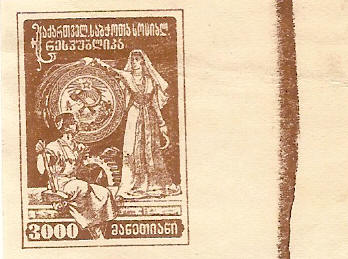
Remember that the imperforates are the
most difficult to find. Happy travels in the
Transcaucasus !
Monday, May 1, 2017
Georgia Peach vs. Georgia PeroshkiGeorgia
is a country in the Caucasus region of Eurasia. Located at the crossroads of Western Asia and Eastern
Europe, it is bounded to the west by the Black Sea, to the north by Russia, to the south by Turkey and Armenia,
and to the southeast by Azerbaijan. The capital and largest city is Tbilisi. It's part of Transcaucasia. Georgia
was formerly a province of the Russian Empire and later a part of the Transcausian Federation of Soviet
Republics. The stamps of Georgia
were replaced in 1923 by those of the Transcaucasian Federated Republics. On March 1, 1994 Georgia joined the Commonwealth of Independent States. Issued in 1922, Scott #28, Soviet Socialist Republic unwatermarked imperforated slate 2000 ruble. Industry & Agriculture Georgian stamps are really nice.
Aesthetic. The imperforates tough to locate. Piroshki is not. Ask for one the next time your at the delicatessen.
|

